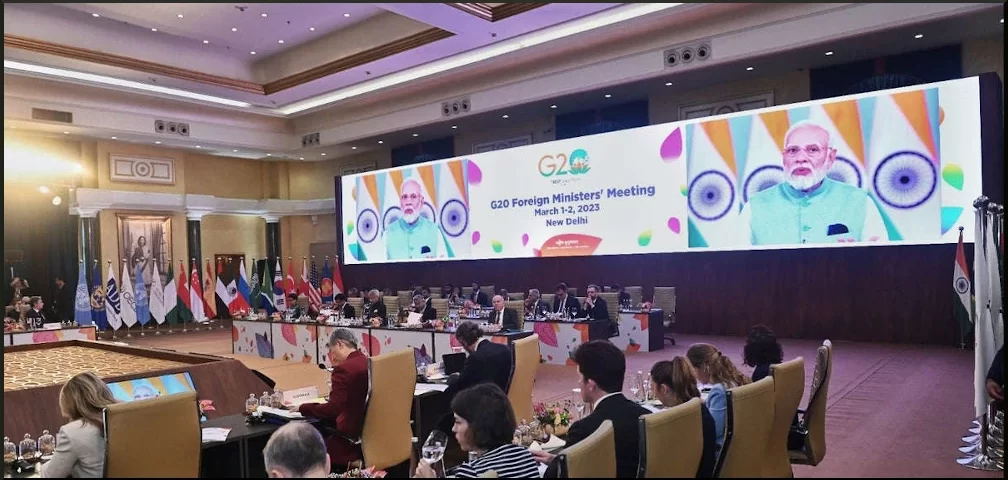by Ahmen Adel, published on BRICSInfo, March 6, 2023
The meeting between the foreign ministers of G20 members in New Delhi on March 1-2 became a farce because Western countries wanted to focus on no other issue but the war in Ukraine. Western countries were not willing to discuss any other topics, such as the interaction between G20 member states, global problems, and the necessary assistance to underdeveloped countries.
The overarching failure of the foreign ministers meeting was reflected in the fact that they could not adopt a final declaration. Chief of Indian diplomacy, Subramanyam Jaishankar, stated that there was no agreement among the heads of diplomacy of the G20 countries regarding the Ukrainian issue.
“There were issues and very frankly they were concerned with the Ukraine conflict. There were divergences. There were differences, which could not be reconciled,” said Jaishankar.
Specifically, there were disagreements about two of the 24 points of the document which concerned the situation in Ukraine. They did not receive the support of Russia and China. This is another demonstration that the West can no longer easily impose its interests on international structures because of countries like Russia.
Russian Foreign Minister Sergey Lavrov said that the final joint document from the meeting was not agreed as a whole due to disputes over the situation in Ukraine.
It is evident that the most important topic at the meeting for the West was the situation in Ukraine. Even if other topics were formally mentioned, they were subordinated and sidelined. However, neither side is currently ready for reconciliation as Russia must complete the operation it started in Ukraine while the West continues to prop up the Kiev regime.
From the very beginning, India wanted climate, energy and food issues to be discussed at the meeting. For this emerging South Asian country, along with most other developing countries, issues related to food, supplies and energy are of the greatest importance, something the West is evidently not interest in.
It is recalled that India proposed for the meeting to focus on important financial and economic issues. India wanted to stress that Western sanctions not only harm targeted countries, but have a knock-on effect, especially on the Global South. However, the Western delegation turned this meeting into a farce, and unsurprisingly, the meeting ended without any agreement.
In effect, as the multipolar world continues to unfold, the West has become so desperate that they effectively stopped understanding the purpose of diplomacy. At such meetings, diplomats, particular foreign ministers, discuss topics that are of interest to all countries. However, the most important thing for the West is to put the focus on Russia and allow serious global problems to be ignored.
US Secretary of State Antony Blinken attempted to blame Moscow for derailing the meeting by saying that it was “marred” by the supposed “unprovoked and unjustified war against Ukraine, deliberate campaign of destruction against civilian targets, and its attack on the core principles of the UN Charter.”
Lavrov hit back by stressing that the meeting failed to reach an agreement because of the “emotional” approach to Ukraine from Western countries.
None-the-less, the most significant meeting on the sidelines of this G20 event was an unscheduled 10-minute conversation between Lavrov and Blinken in what was their first contact since last summer.
A senior US official said Blinken told Lavrov that Washington will continue supporting Ukraine for “as long as the war continues” and that Moscow should end its suspension from participating in the New START nuclear treaty. America’s top diplomat also demanded the release of Paul Whelan, a former US marine detained in Russia for espionage acts.
None-the-less, according to the US official, Washington believes that the Lavrov-Blinken meeting did not have a meaningful impact on Moscow’s view and position of the war.
Indian Prime Minister Narendra Modi, for his part, opened the meeting with a video address urging them to “rise above [their] differences” and that “we should not allow issues that we cannot resolve together to come in the way of those we can.”
This is in line with India’s motto for its G20 hosting – “One Earth One Family One Future”. However, this is now the second year running that the G20 foreign ministers’ meeting has failed to produce a joint statement. It is recalled that last year’s meeting in Bali ended in bitter disagreements over the Ukraine war.
What is certainly becoming evident to the entire world is that the West is becoming increasingly frustrated as it is not able to impose its interest on other countries. This has led to unprofessional diplomacy, demonstrating that Western diplomats obsess over Ukraine as if it is the only crisis in the world that needs immediate attention.
Ahmed Adel is a Cairo-based geopolitics and political economy researcher.
